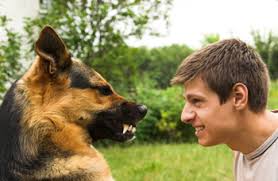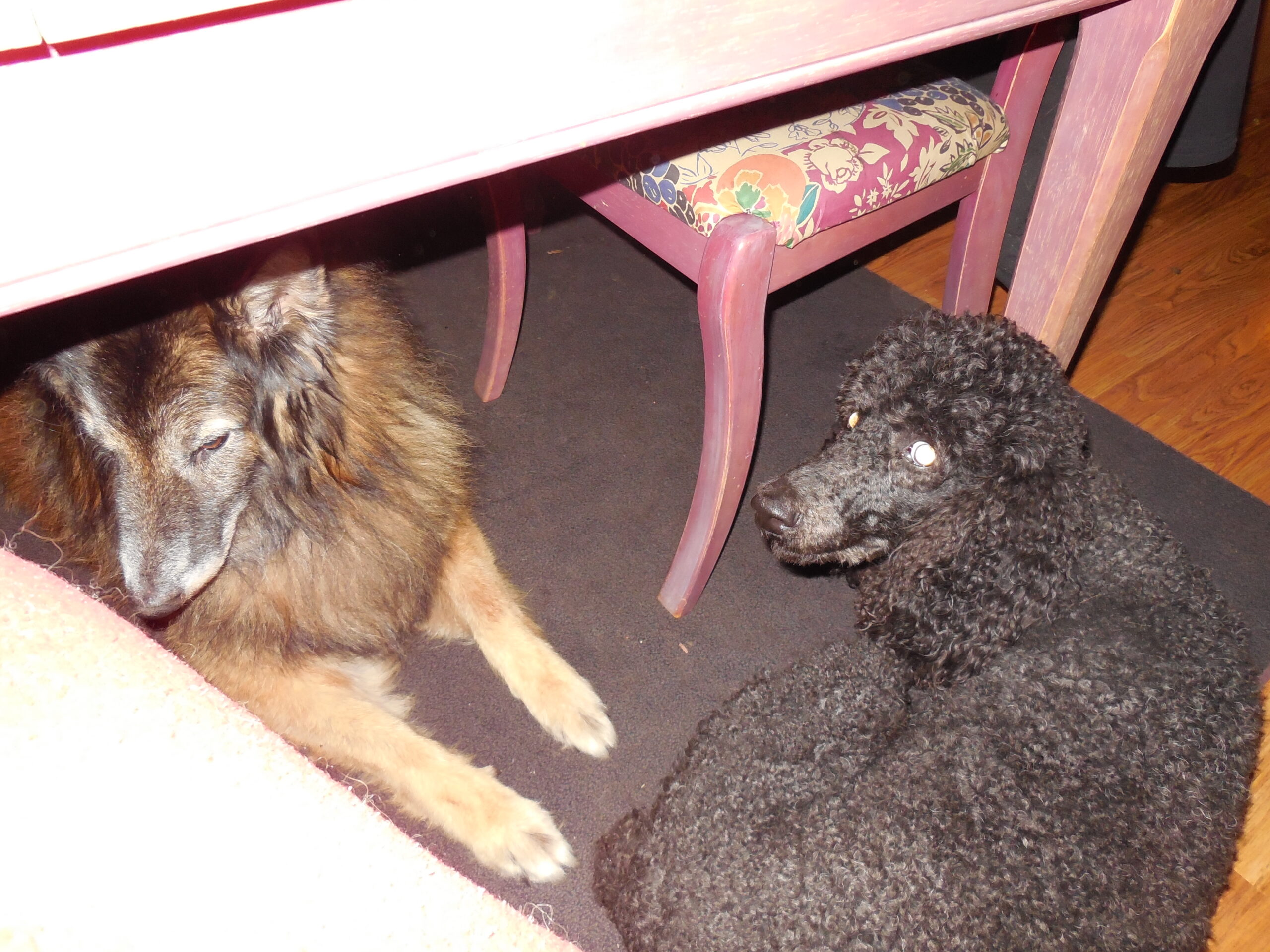Barks Blog
Growl versus Scowl
Growling is often punished. If we understand that growling is communication and that there are many different types of growls, then we would respond as if a human was scowling at us.
Scowling says a lot without sound. Imagine adding a growl to the above looks.
The definition of a scowl is to frown in an angry or bad-tempered way or an angry or bad-tempered expression. We would listen to the implications directed toward us and give this human space, take it as a warning. Dogs do everything with their mouths, to include communicate, eat, pick things up and more. There are many great articles on growling by some of the top trainers in the world.
A man and dog growling at each other
Trainer Leah Roberts and PPG Founding Member (who passed away earlier this year) said in her article Thank Your Dog for Growling, “Not only does correction inhibit the dog’s way of communicating his discomfort, the owner’s tone and body language exacerbate it.”
Pat Miller, PhD describes a growl as a gift. In her article by the same name she says, ” The dog who doesn’t want to bite or fight tries his hardest to make you go away. He may begin with subtle signs of discomfort that are often overlooked by many humans – tension in body movements, a stiffly wagging tail. “Please,” he says gently, “I don’t want you to be here.” If you continue to invade his comfort zone, his threats may intensify, with more tension, a hard stare and a low growl.”
A Standard Poodle board and train growls at my Chancellor, who decides to “look away” to diffuse the growl. He might have chosen a different communication, but didn’t
In my household with two intact males and one neutered male growling is a form of communication that can mean a number of things. My 10-year-old male Belgian Tervuren, Kody Bear, has a play growl, and also an “I’m not okay with this” growl. He also has a growl to indicate to the younger Tervuren not to herd him. My Chancellor’s growl is always a warning and my younger Tervuren, Valor has an indoor voice, a growl if he sees someone passing by and it quickly ends. He has a growl that is definitely intended for resource guarding at a mild level. These growls have never been punished and they have never led to anything more than communication. They don’t occur often.
In an article titled Why Growls are Good, author Nicole Wilde points out that “Growling is a perfectly acceptable canine warning. It’s a dog’s way of saying, “Hey, I don’t like that,” “Don’t come any closer!” or “Please stop what you’re doing.”
The question we should ask is, “Why is my dog growling and will it go further?” If it is a warning, it could go further were the dog pushed beyond the warning stage. So to respect and understand the warning can actually end the communication or give insight as to what not to do. If it is a play growl or an indoor voice growl (versus a bark), it probably won’t go any further and is just a different form of communication verging on excitement.
Why are we afraid of the growl? APDT’s Don Hanson said it well in an article on Bite Prevention, “Dogs typically growl when they are afraid, angry, or upset. These are all emotional conditions that could precede a bite and are a perfect cue for us to change our behavior so that the dog does not need to escalate to the next step – biting.” Post-growl can also be bark, lunge.
We are afraid because a growl could lead to biting. We are worried when someone scowls at us that it will lead to other repercussions. It is healthy to respect it, and to prevent more serious outcomes.
My own dogs used to growl coming in the door after pottying or playing. To change the way they viewed the door, I started asking for a sit before coming in, and then following it with the dog’s name who would come in first and rewarding no growling with a treat toss. Then dog two and dog three. Today, they know the door means good things coming, and so either automatically sit or they just simply don’t growl and all three can trot into the open door just fine to retrieve a reward. Even if no reward is present and there is praise or toy tosses, it simply makes the behavior of not growling coming through the door stronger. It prevents a growl leading to something more like redirected aggression or multi-dog household fights.
Working with challenging dogs daily, I wonder if it is just me or is growling music to not only my ears, but to other trainers. It sets a boundary. I like growling, in all its various forms – it says “hey you, I’m not comfortable with (fill in the blank)” – it is diffusible versus the alternative, a bite. Yet, some people are still frightened when we should just be listening and respond appropriately. Like a scowl, a growl says you’ve gone too far. The scariest dogs I work with are those who give no growl. They are scary, unpredictable and can be dangerous. This is the reason I would most likely wish to hear a growl, rather than the alternative, a bark, lunge or bite.
PPG member Inna Krasnovsky, who recently appeared on ABC’s Good Morning America says, “I like growling. Growling is communication and communication is imperative when working with aggression cases. Dogs that have been punished for growling or just never give a protracted warning and bite instead-these are far more challenging and scary to work with.”
A quote by Steve Mann of the IMDT in the UK, says “a growl from a dog is a compliment not an insult“.
If you look at a growl in that manner, it takes away the age-old reasons for punishing a growl. It puts it into perspective. The dog is communicating their discomfort, just as a human would communicate their discomfort with a scowl.
Leah Roberts (rest in peace) “Thank your dog for growling” https://woofology.info/thankforgrowling.htm
Pat Miller’s “The Gift of the Growl” https://www.peaceablepaws.com/articles.php?subaction=showfull&id=1282173843
Nicole Wilde’s “Why growls are good” https://wildewmn.wordpress.com/…/22/why-growling-is-good/
Dog Bite Prevention Tip – Growling Dogs typically growl when they are afraid, angry or upset by Don Hanson https://directory.libsyn.com/episode/index/show/woofmeowshow/id/2302749





